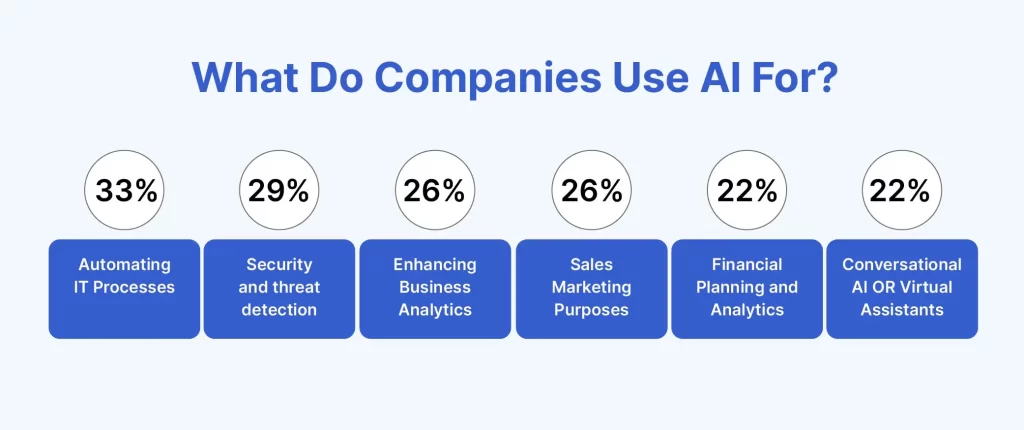When teams operate independently, it creates communication gaps that can lead to disorder. In contrast, when teams collaborate, they tend to be more efficient.
AI, according to 86% of CEOs, is a regular component of their work. It takes the form of software that assists with routine chores rather than large robots or machines. Artificial Intelligence (AI) is becoming increasingly crucial for organizations in ways that we haven’t seen before because it can predict what customers will do and even automate manual chores.
Because AI is becoming more and more popular among entrepreneurs, it makes sense that it is one of the newest business trends. Have you noticed how many businesses are using AI to improve their goods that didn’t originally use the technology? And the outcomes are often rather striking.
Whether the field holds promise or if the market is already saturated is still up for debate. Should anyone be considering starting a business focused on developing AI products? We examine artificial intelligence in greater detail and present some of the top AI business concepts on this page.
The AI market is experiencing unprecedented growth, reshaping industries and revolutionizing business landscapes. As of 2022, the global AI market was valued at over $62 billion, with projections indicating exponential expansion in the coming years. The demand for AI technologies is propelled by their ability to enhance efficiency, optimize decision-making, and unlock innovative solutions across diverse sectors.
Key drivers of the AI market include the proliferation of big data, advancements in machine learning algorithms, and the increasing adoption of AI in various applications. Industries such as healthcare, finance, retail, and manufacturing are embracing AI to streamline processes, improve customer experiences, and gain a competitive edge.

A McKinsey & Company analysis claims that generative AI is poised to usher in a new era of productivity across numerous commercial disciplines. It is anticipated that generative AI will have an annual impact on company productivity of between $2.6 trillion and $4.4 trillion.
A Forbes survey indicates that companies in a variety of industries are depending more and more on AI to improve and streamline their operations. Leading applications include cybersecurity and fraud management, which are used by 51% of firms, and customer service, for which 56% of businesses use AI.

Many companies specialize in providing cutting-edge Artificial Intelligence Development Services to help businesses leverage the full potential of advanced technologies for innovative solutions.
Artificial Intelligence Development Services continue to revolutionize industries, providing businesses with advanced solutions to enhance efficiency, streamline processes, and unlock innovative possibilities in the digital era.
In the era of e-commerce, the shopping experience is being revolutionized by the integration of artificial intelligence (AI) into personalized shopping assistants. Imagine having your very own AI shopping companion that not only understands your preferences but also anticipates your needs, making the entire process more enjoyable and efficient.
One of the key advantages of such a system is the time-saving aspect. Instead of sifting through countless products, users are presented with a tailored selection, significantly reducing decision fatigue. Moreover, the AI assistant can keep track of inventory, notify users of sales and discounts on their preferred items, and even suggest complementary products to enhance their shopping experience.
The integration of machine learning algorithms enables the assistant to continuously learn and adapt to the user’s evolving preferences. As users interact with the assistant, providing feedback and making purchases, the AI refines its understanding, ensuring that recommendations become increasingly accurate over time.
In essence, the AI-Powered Personalized Shopping Assistant represents the future of online retail. By harnessing the power of AI, retailers can create a more personalized and engaging shopping journey, fostering customer loyalty and satisfaction in the dynamic landscape of digital commerce.
In the ever-evolving landscape of cyber threats, the integration of artificial intelligence (AI) has become a linchpin in the development of cutting-edge cybersecurity solutions. AI-based cybersecurity represents a paradigm shift, leveraging advanced algorithms and machine learning to fortify digital defenses and proactively combat sophisticated cyber threats.
Anomaly detection is a crucial aspect of AI-based cybersecurity solutions. These systems establish a baseline of normal network behavior and promptly identify deviations that may indicate a potential security breach. By continuously learning from new data, AI algorithms enhance their accuracy in distinguishing between benign activities and malicious actions.
Furthermore, AI is instrumental in automating threat response mechanisms. In the face of a cyber incident, AI systems can execute predefined actions to contain and neutralize the threat, reducing the response time and mitigating potential damage. This proactive approach is especially critical in defending against zero-day attacks and other emerging threats.
Machine learning algorithms play a pivotal role in creating predictive models for cybersecurity. By analyzing historical data and identifying trends, these models can forecast potential future threats, allowing organizations to implement preemptive measures and stay one step ahead of cyber adversaries.
However, the integration of AI in cybersecurity is not without its challenges. Ensuring the ethical use of AI, addressing biases in algorithms, and safeguarding user privacy are paramount considerations. Striking a balance between the autonomy of AI systems and human oversight is crucial to building trust in the reliability and effectiveness of these solutions.
In the realm of healthcare, where timely intervention can be a matter of life and death, the integration of predictive analytics powered by artificial intelligence (AI) is reshaping the landscape. Healthcare predictive analytics involves harnessing the capabilities of machine learning algorithms to analyze vast datasets, predict potential outcomes, and provide actionable insights for improved patient care and resource management.
One of the primary applications of healthcare predictive analytics is in disease prediction and prevention. By analyzing historical patient data, lifestyle factors, and genetic information, AI algorithms can identify patterns and risk factors associated with various diseases. This enables healthcare professionals to intervene early, offering personalized preventive measures and interventions to reduce the likelihood of disease onset.
Predictive analytics also plays a pivotal role in optimizing hospital operations. AI algorithms can analyze patient admission patterns, resource utilization, and staff allocation to forecast peak times and allocate resources efficiently. This not only enhances patient care but also contributes to cost-effectiveness and operational efficiency within healthcare institutions.
Emergency room (ER) utilization is another area where predictive analytics proves beneficial. By analyzing historical data and current patient conditions, AI can predict the influx of patients to the ER, enabling hospitals to better prepare for surges in demand and allocate resources accordingly.
For businesses, hiring new employees is a costly and time-consuming procedure. You might create an AI-powered platform that matches job searchers with potential companies by analyzing a wide range of characteristics, including talents, experience, cultural fit, and even subtleties like work habits. Over time, the AI might dramatically improve placement accuracy by continuously learning from its matches, which would save recruiting expenses and employee churn.
Revenue sources include premium services for job searchers, subscription payments from companies, and data insights for HR departments. Difficulties include data accuracy, traditional job boards and networking platforms’ competitiveness, and discrimination-related legal problems.
The emergence of virtual interior design consultants, driven by the capabilities of artificial intelligence (AI), is reshaping the way individuals conceptualize and actualize their living spaces. This innovative application combines the artistic flair of interior design with the efficiency and personalization afforded by AI algorithms.
At the core of the virtual interior design consultant is the ability to analyze user preferences, lifestyle, and existing décor. By processing this information, AI algorithms can generate personalized design recommendations, taking into account color schemes, furniture styles, and spatial considerations that align with the user’s taste and functional requirements.
One of the standout features of virtual interior design consultants is their ability to simulate the proposed changes in a virtual environment. Users can visualize how different furniture pieces, color palettes, and design elements would look in their actual living spaces, facilitating more informed decision-making and reducing the uncertainty associated with traditional interior design processes.
The efficiency and convenience of virtual interior design extend to product recommendations and sourcing. AI algorithms can curate a selection of furniture and décor items that not only match the design aesthetic but also consider budget constraints and availability. This streamlined approach simplifies the purchasing process for users, enhancing the overall customer experience.
Additionally, the virtual interior design consultant can adapt and evolve based on user feedback. As users interact with the system, providing input on design preferences and making choices, the AI refines its understanding and refines future recommendations. This iterative learning process ensures that the virtual consultant becomes increasingly adept at capturing the nuances of individual style.
Customized e-learning experiences represent a transformative approach to education, leveraging technology to tailor learning content, delivery methods, and assessments to the individual needs and preferences of learners. This personalized approach enhances engagement, knowledge retention, and overall effectiveness in educational settings. Here are key components and benefits of customized e-learning experiences:
Not everyone can benefit from the one-size-fits-all approach offered by traditional e-learning platforms. You might design a more customized learning experience by utilizing AI algorithms that adjust to a student’s learning style, pace, and strengths and limitations. Your platform may benefit professionals seeking further education, hobbyists hoping to pick up a new skill, and students searching for tutoring in grades K–12.
Sustainable energy management is a holistic approach to overseeing, optimizing, and conserving energy resources within an organization or community, with the goal of minimizing environmental impact and promoting long-term viability. This multifaceted strategy integrates advanced technologies, data analytics, and renewable energy sources to enhance efficiency, reduce carbon footprints, and contribute to a more sustainable future.
Sustainability is essential; it’s not simply a catchphrase. AI has the potential to be extremely important in more effectively controlling energy use. AI can provide cost-effective and environmentally beneficial solutions, whether it’s a smart grid that adjusts to usage patterns or a home system that controls energy consumption without human interaction.
ChatGPT, with its remarkable natural language processing capabilities, has ushered in a new era for businesses. The integration of this advanced chatbot technology has proven to enhance customer interactions, streamline communication processes, and boost overall operational efficiency. Businesses leveraging ChatGPT experience improved customer satisfaction through personalized and responsive interactions, leading to increased loyalty and retention
Business owners are confident that ChatGPT will enhance their operations. Within the next 12 months, a staggering 90% of respondents think ChatGPT will have a beneficial effect on their organizations. They cite various causes for this optimistic perspective. Of those surveyed, 58% think ChatGPT will customize the customer experience, and 70% think it will speed up the creation of content.
Additionally, business owners expect better decision-making (48%) and increased credibility (47%) as well as higher online traffic (57%) and more efficient job procedures (53%).
Many entrepreneurs view AI SaaS concepts as a means of enhancing operational effectiveness, cutting costs, gaining a competitive advantage, and meeting shifting consumer demands. Building such items would therefore be worthwhile to test. But “how” is the question.
IntellicoWorks is the tech partner who can assist you in carrying out the project. With years of experience working with startups, we have assisted numerous businesses in realizing their concepts and expanding their offerings.
Explore AI Development Services that Redefine Possibilities!
Follow IntellicoWorks for more insights!

Talk to us and let’s build something great together
A Subsidiary of Vaival Technologies, LLC
IntelliCoworks is a leading DevOps, SecOps and DataOps service provider and specializes in delivering tailored solutions using the latest technologies to serve various industries. Our DevOps engineers help companies with the endless process of securing both data and operations.
Ops
Cloud
AI & ML
Copyrights © 2023 byIntellicoworks. All rights reserved.